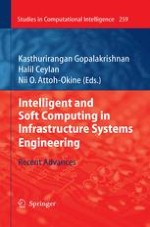2009 | OriginalPaper | Buchkapitel
Knowledge Discovery and Data Mining Using Artificial Intelligence to Unravel Porous Asphalt Concrete in the Netherlands
verfasst von : Maryam Miradi, Andre A. A. Molenaar, Martin F. C. van de Ven
Erschienen in: Intelligent and Soft Computing in Infrastructure Systems Engineering
Verlag: Springer Berlin Heidelberg
Aktivieren Sie unsere intelligente Suche, um passende Fachinhalte oder Patente zu finden.
Wählen Sie Textabschnitte aus um mit Künstlicher Intelligenz passenden Patente zu finden. powered by
Markieren Sie Textabschnitte, um KI-gestützt weitere passende Inhalte zu finden. powered by
The main goal of this study was to discover knowledge from data about Porous Asphalt Concrete (PAC) roads to achieve a better understanding of the behavior of them and via this understanding improve pavement quality and enhance its lifespan. The knowledge discovery process includes five steps, being understanding the problem, understanding the data, data preparation, data mining (modeling), and the interpretation/evaluation of the results of the models. At the moment, almost 75% of the Dutch motorways network has a PAC top layer. The main damage of PAC is raveling, which is when the top layer of the road loses stones. The SHRP-NL databases provided ten years of material property data from PAC roads. The data for climate and traffic were obtained from databases of the Royal Dutch Meteorological Institute (KNMI) and the Ministry of Transport and Water Management, respectively. Due to the low number of data points (74 data points), an extensive variable selection was performed using eight different methods to determine the four or five most influential input variables and consequently reduce the input dimension. These methods were decision trees, genetic polynomial, artificial neural network, rough set theory, correlation based variable selection with bidirectional and genetic search, wrappers of neural network with genetic search, and relief ranking filter. The modeling step resulted in 8 intelligent models which were developed using two prediction techniques, being artificial neural networks and support vector machines and two rule-based techniques, being decision trees and rough set theory. Taking the low number of data points into account, the prediction models showed a good performance (R2 = 0.95). The rule based models were transparent and easy to interpret but performed less.
